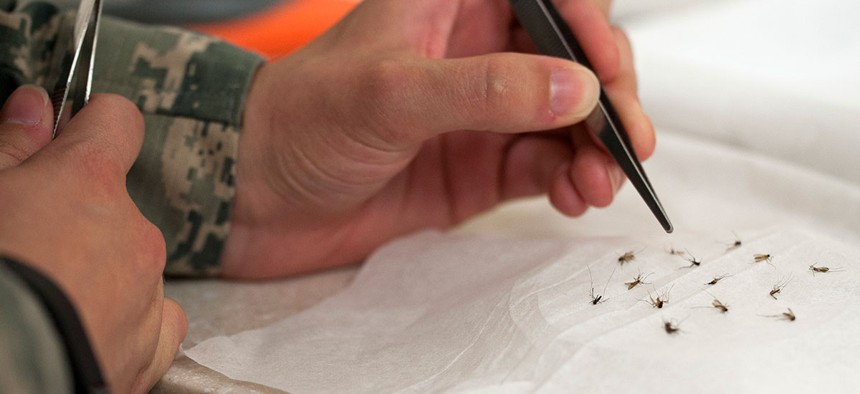
Airman Kristina Dugan, public health technician, counts and logs mosquitoes July 20 at Eglin Air Force Base, Fla. Ilka Cole/Air Force
Zika's Threat to the U.S. Military
More than 40 service members, including one pregnant woman, have been infected with the mosquito-borne virus since January.
More than 40 members of the U.S. military have contracted the Zika virus this year in countries where it is present, government officials said; among them a pregnant woman, for whom Zika can be particularly dangerous.
The news was first reported by the Military Times Monday. The total count stood at 33 service members then, but has risen to 41 in the past week, Military Times reported Wednesday. Some of the individuals infected are active-duty service members. Pentagon officials would not say how many remain ill, where they are exactly, and whether any have returned to the U.S.
Defense officials began tracking the virus among U.S. troops in January. In June, the Pentagon said at least 11 U.S. troops had become infected with Zika in countries where the virus is transmitted.
As of July 27, 1,658 cases of Zika infection have been reported in the continental U.S. and 4,750 in U.S. territories, including Puerto Rico, according to the CDC. The cases include 433 pregnant women in the U.S., and 422 in the territories.
Zika is primarily transmitted through Aedes mosquitoes, the same insects that spread the dengue and Chikungunya viruses. For the 1 in 5 people infected with the virus who will get sick, the symptoms are flu-like and mild; fever, rash, joint pain, and red eyes last up to a week. But for pregnant women, the virus carries far worse outcomes: Zika can cause microcephaly in babies born to infected mothers, a condition that stunts the growth of babies’ heads and can result in serious cognitive, neurological, and motor disabilities. More than 4,900 cases of Zika-related microcephaly cases have been reported this year in Brazil, the country at the center of the Zika outbreak, which has spread to other parts of South America, the Caribbean, some Pacific islands, and at least one African country, Cape Verde.
In February, the Pentagon said pregnant family members of active-duty troops and civilian employees of the Defense Department living in areas affected by Zika would be allowed to request to be relocated. The Military Times reports nearly 200 U.S. military installations exist in countries where the virus has been detected and spread.







